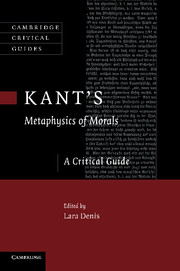Book contents
- Frontmatter
- Contents
- Notes on contributors
- Acknowledgements
- List of translations and abbreviations
- Introduction
- 1 Kant's Metaphysics of Morals: the history and significance of its deferral
- 2 Reason, desire, and the will
- 3 Justice without virtue
- 4 Kant's innate right as a rational criterion for human rights
- 5 Intelligible possession of objects of choice
- 6 Punishment, retribution, and the coercive enforcement of right
- 7 Moral feelings in the Metaphysics of Morals
- 8 What is the enemy of virtue?
- 9 Freedom, primacy, and perfect duties to oneself
- 10 Duties to and regarding others
- 11 Duties regarding animals
- 12 Kant's Tugendlehre as normative ethics
- Bibliography
- Index
1 - Kant's Metaphysics of Morals: the history and significance of its deferral
Published online by Cambridge University Press: 10 January 2011
- Frontmatter
- Contents
- Notes on contributors
- Acknowledgements
- List of translations and abbreviations
- Introduction
- 1 Kant's Metaphysics of Morals: the history and significance of its deferral
- 2 Reason, desire, and the will
- 3 Justice without virtue
- 4 Kant's innate right as a rational criterion for human rights
- 5 Intelligible possession of objects of choice
- 6 Punishment, retribution, and the coercive enforcement of right
- 7 Moral feelings in the Metaphysics of Morals
- 8 What is the enemy of virtue?
- 9 Freedom, primacy, and perfect duties to oneself
- 10 Duties to and regarding others
- 11 Duties regarding animals
- 12 Kant's Tugendlehre as normative ethics
- Bibliography
- Index
Summary
INTRODUCTION
Kant's Metaphysics of Morals appeared in 1797. It was one of Kant's last works. Only two other books appeared later: The Dispute of the Faculties and the Anthropology from a Pragmatic Point of View, both published in 1798. The Logic of 1801 and the Physical Geography of 1802 were edited by others, namely Benjamin Jäsche and Friedrich Theodor Rink, on the basis of Kant's lecture notes. It is tempting to view the Metaphysics of Morals and the Anthropology from a Pragmatic Point of View also as editions of lecture notes. The difference is just that Kant did the editing himself, though his age and the ever-increasing weakness of his mental faculties made this task very difficult. Some have argued that it might almost have been better if someone else had taken over this task for Kant in the case of the Metaphysics of Morals and Anthropology as well.
Many of Kant's contemporaries felt this way, in any case. Friedrich Schleiermacher wrote a very negative review of the Anthropology, finding that “a summary of this book could not be much more than a collection of trivial matters. If, on the other hand, it were intended to give a sketch of the plan and its execution … it would necessarily give a distinct picture of the most peculiar confusion.” Arthur Schopenhauer found that in the Tugendlehre, “this counterpart of his deplorable Rechtslehre, the effects of his weakness brought on by old age are predominant.” Judgments like these could be multiplied.
- Type
- Chapter
- Information
- Kant's Metaphysics of MoralsA Critical Guide, pp. 9 - 27Publisher: Cambridge University PressPrint publication year: 2010
- 27
- Cited by

